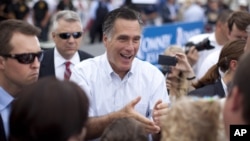Mitt Romney laid out a plan Thursday that he says will lead the United States to energy independence by 2020, while creating three million jobs and bringing in more than $1 trillion in revenue.
Speaking in the town of Hobbs in the southwestern state of New Mexico, the presumptive Republican presidential candidate said the plan "is not some pie in the sky kind of thing," but rather "a real achievable objective.''
Romney said the plan includes approving the Keystone XL pipeline, which would carry oil extracted from the so-called "tar sands" in Canada's Alberta province to Texas, and forming a North American "energy partnership" with Canada and Mexico.
In January, the Obama administration denied a permit for the proposed pipeline, saying congressional Republicans did not give it enough time to determine the project's impact on public safety and the environment.
Romney said Thursday that he would give individual states, rather than the federal government, the authority to issue permits for new oil wells on federal land in order to speed up the licensing process. He said he would also accelerate the development of oil wells off the coast of the states of Virginia and North Carolina, and in the Gulf of Mexico.
Romney said his plan would not only create millions of jobs, but would also lower energy prices, reduce the U.S. trade deficit by 80 percent and improve U.S. national security by making the country less reliant on unfriendly countries for energy supplies.
The presumptive Republican nominee said his energy plan will help the U.S. economy come "roaring back."
The Obama administration has noted that during the president's time in office, U.S. dependence on foreign oil has gone below 50 percent for the first time in 13 years.
And White House spokesman Jay Carney said Thursday that the Obama administration has provided "very aggressive support" for every form of energy, including nuclear, wind, solar, biodiesel, and oil and gas.
Speaking in the town of Hobbs in the southwestern state of New Mexico, the presumptive Republican presidential candidate said the plan "is not some pie in the sky kind of thing," but rather "a real achievable objective.''
Romney said the plan includes approving the Keystone XL pipeline, which would carry oil extracted from the so-called "tar sands" in Canada's Alberta province to Texas, and forming a North American "energy partnership" with Canada and Mexico.
In January, the Obama administration denied a permit for the proposed pipeline, saying congressional Republicans did not give it enough time to determine the project's impact on public safety and the environment.
Romney said Thursday that he would give individual states, rather than the federal government, the authority to issue permits for new oil wells on federal land in order to speed up the licensing process. He said he would also accelerate the development of oil wells off the coast of the states of Virginia and North Carolina, and in the Gulf of Mexico.
Romney said his plan would not only create millions of jobs, but would also lower energy prices, reduce the U.S. trade deficit by 80 percent and improve U.S. national security by making the country less reliant on unfriendly countries for energy supplies.
The presumptive Republican nominee said his energy plan will help the U.S. economy come "roaring back."
The Obama administration has noted that during the president's time in office, U.S. dependence on foreign oil has gone below 50 percent for the first time in 13 years.
And White House spokesman Jay Carney said Thursday that the Obama administration has provided "very aggressive support" for every form of energy, including nuclear, wind, solar, biodiesel, and oil and gas.





